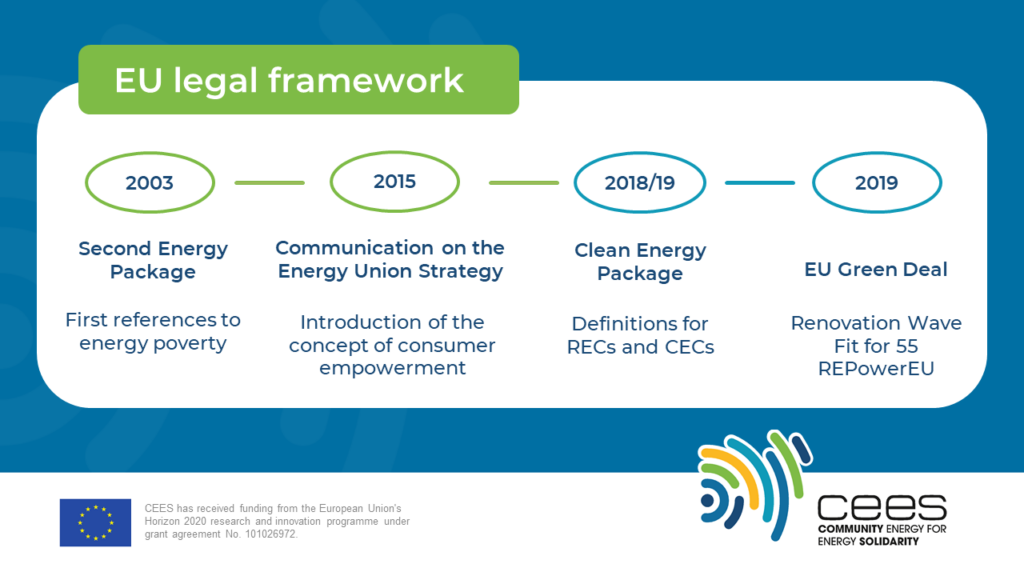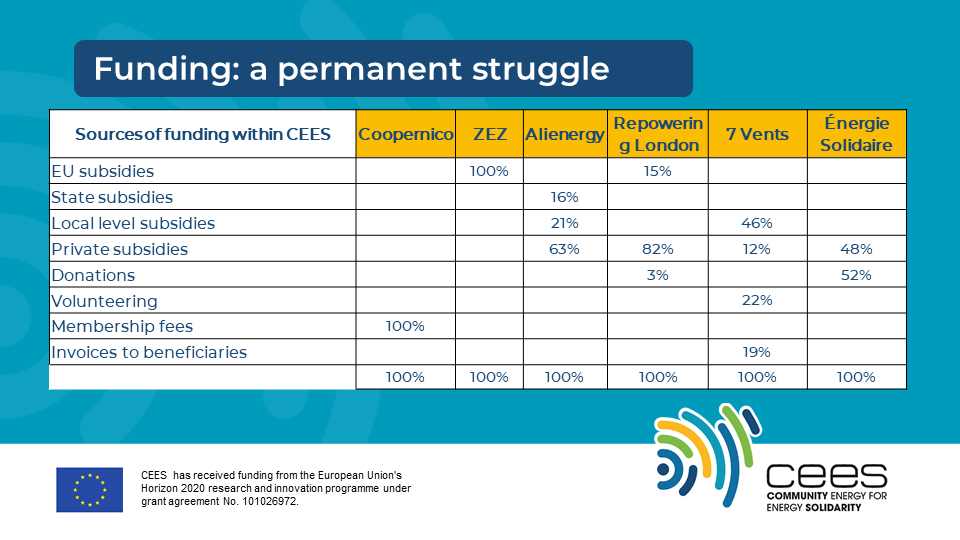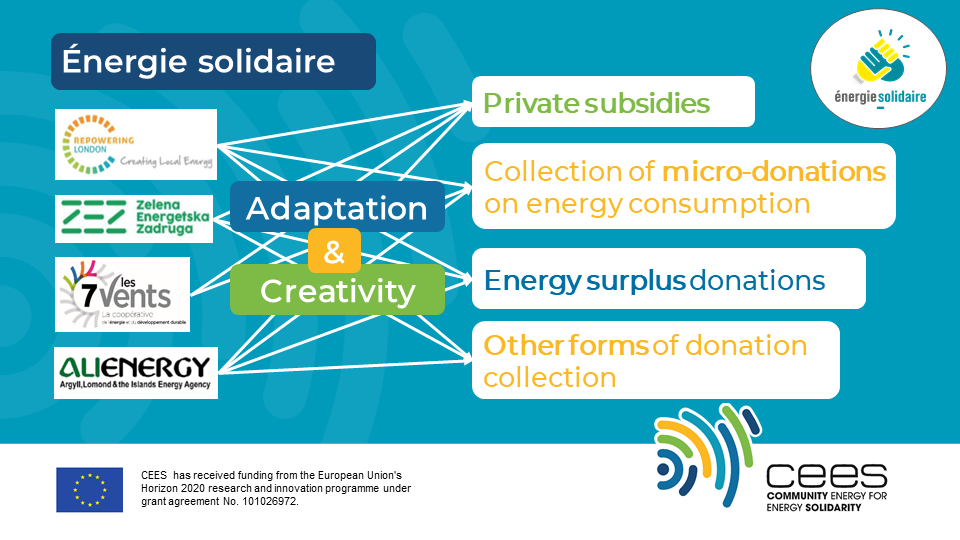The ‘will’ to take action on energy poverty is growing among energy communities (ECs). -But often the ‘way’ is less straightforward than one would hope.
In a survey CEES carried out in 2021, of ~100 respondents, some 80% reported wanting to help those in energy vulnerability. One-third said they ‘do not currently work on energy poverty’ or ‘work on it a little’, while only one-third say it is a high priority or main focus. Lack of funding (~50%), lack of staff (~50%), lack of knowledge/expertise (25%) and legislative/regulatory barriers (15%) were cited as main barriers to doing more.
Session 4 (of 5) of the Community Energy for Energy Solidarity (CEES) webinar day highlighted research CEES partners have undertaken in relation to the challenges and barriers ECs typically face in two key areas: legal and regulatory frameworks and financing and funding.
Regulatory and legal frameworks for energy communities and energy poverty: Do they line up? ● REScoop.eu
Starting on a positive note, Heleen Schockaert of REScoop.eu outlined how the European Commission (EC) has gradually taken steps to recognise the problem of energy poverty and the value of both renewable energy communities (RECs) and citizen energy communities (CECs) in the clean energy transition. Since 2003, relevant recommendations and obligations have been increasingly refined in diverse directives and communications. In launching the ‘just, clean energy transition’ in 2019, the EC has made more effort to align initiatives across various programmes.

Still, at EU and national levels, CEES research has found that legal and regulatory frameworks may be supportive or may throw up barriers. Across the countries in which CEES partners are operating, the following insights emerged:
- Croatia: With no clear definition of energy poverty and little data collected, it is difficult to assess the scope of the problem. Recent laws (2021) define and/or recognise both energy poverty and energy communities, but transposition of the relevant laws is lacking.
- France: Having established, in 2010 in the Grenelle II Act, an official definition for energy poverty, France is recognised as a leader in tackling energy poverty. In 2015, the Energy Transition Law for Green Growth first offered incentives to promote local financial participation in renewable energy projects. The community energy movement has since grown steadily; however, the potential role ECs could play in alleviating energy poverty is not yet recognised.
- Portugal: Although energy poverty only recently became recognised on the political agenda, Portugal has made good progress on the topics of both energy communities and energy poverty and their interlinkages. The country’s NECP can be considered a good example of integrating both as a policy priority. At present, however, energy communities face a significant number of barriers.
- United Kingdom: The birthplace of research on energy poverty, the UK has many relevant programmes, regulations and schemes to assist people in energy poverty. RECs and CECs are also broadly supported. As the UK withdrew from the European Union (as of 31 January 2020), it is no longer obliged to transpose EU legislation into national law. In this case, CEES did not undertake in-depth analysis.
A general takeaway is that significant barriers still constrain ECs from fulfilling their social role. With this in mind, the CEES report offers takeaways and recommendations for EU and national policy makers. Ensuring energy and climate policies are ‘just’ by design – and strengthening links across interrelated areas – are critical overarching elements. This calls for including affected people in the policy-making process. In turn, regulations need to be clear and supported with guidance. Click here to access the full report.
Financing and funding: a permanent struggle ● Energy solidaire
As any entity tackling energy poverty will attest, it is a resource-intensive undertaking. Whether aiming to assist with hard or soft measures, substantial human resources are required to identify and engage with vulnerable households and with other organisations that make logical partners. In turn, the costs of materials – whether warm blankets or insulation – for interventions can quickly add up, particularly during this time of economic strain.
To date, most energy communities operate on a business model designed to deliver low-cost energy while providing an acceptable rate of return to investors. Few have built assisting vulnerable households into their budgets. With energy poverty on the rise, more ECs are keen to help – and thus eager to learn about effective financing and funding strategies.
Reflecting workshops organised with CEES partners and other ECs, Kevin Chaplais of Les amis d’enercoop provided a frank look at the range of financial and funding mechanisms currently in place. In most cases, risks are evident in that a given entity relies heavily on one source (whether private or public) or has to dedicate substantial human resources to applying for grants, which they may or may not secure.

As CEES partners progress into the pilot stage of the project, pursuing new financing and funding opportunities is a key focus for several. As indicated, they plan to tap into each other’s experience while finding creative ways to adapt successful schemes to their own actions and local contexts. In November 2022, ZEZ (Croatia) ran its first ever crowd-funding campaign to support distribution of Cozy Kits to vulnerable households. ZEZ is pleased to report it reached/surpassed its goal within the one-month campaign.

Better alignment needed to enable ECs to tackle energy poverty
Across CEES initial investigation of how well regulatory and legal frameworks and financing/funding schemes support action to tackle energy poverty, the primary finding is that poor alignment undermines roll-out of effective, cost-efficient initiatives. An advantage of ECs, however, is that they typically engage with multiple entities at local levels and can perhaps influence change from the ground up. At the same time, CEES offers a unique opportunity for exchange across four diverse national contexts. This may support faster uptake of proven approaches.
Watch the full webinar on youtube.
Or check out blogs and links to the other sessions:
- Community energy for energy solidarity: A timely approach for a more just future (Session 1)
- Identifying and engaging with people in energy poverty and other stakeholders (Session 2)
- Taking action to alleviate energy poverty through hard or soft measures (Session 3)
- Evaluating energy poverty projects: key principles and themes (Session 5)